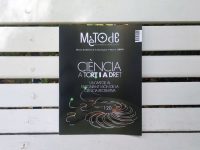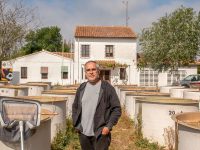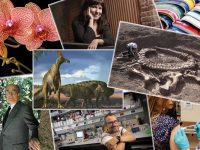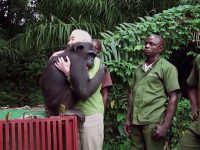Interview with Pere Estupinyà
«It is a mistake to popularize science trying to place it as a protagonist to be explained»
Writer, science communicator and host of El Cazador de cerebros
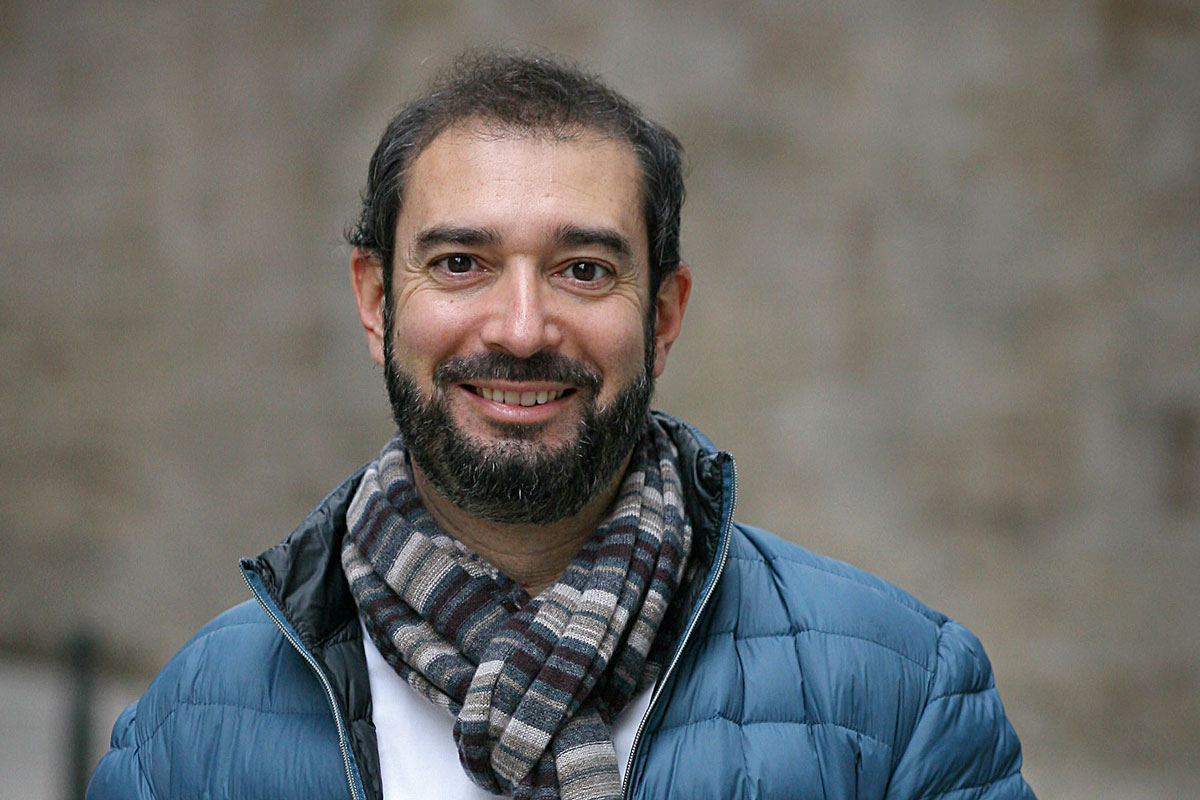
Science communicator, writer and public speaker. That is how Pere Estupinyà (Tortosa, 1974) describes himself. He has a degree in chemistry and biochemistry, and started explaining his job and readings to friends. Later he collaborated in a local radio station in Tortosa and in a regional newspaper. In 2001 (and until 2005), perhaps thanks to a mixture of self-confidence and fortune, Estupinyà started working at Televisión Española (TVE) as an editor for the TV program Redes. He explains that, in those times when you are not clear on what you should be doing, he wrote to the TV program offering unpaid collaborations. Eduard Punset answered: «Send us your CV. We are looking for people who want to work on the public understanding of science.» He was interviewed and a few days later a former team member left. Estupinyà seized the opportunity.

Photo: Jesús Císcar
The experience that transformed him, however, was spending ten months in MIT laboratories and classrooms, between 2007 and 2008, thanks to the Knight Science Journalism scholarship program. He was paid – handsomely – for learning. That place also witnessed the birth of the «brain snatcher», Estupinyà’s alter ego, under which he wrote The brain snatcher: Sharing the scientific knowledge of the world’s most brilliant minds (Debate, 2010) and The brain snatcher. Picking cherries with our eyes closed (Debate, 2016). He replaced paper with the small screen in 2015 in Ecuador, and then again in September 2016 in TVE (Spain). Here, however, he was renamed El cazador de cerebros. It is just the same, but due to copyright issues, the TV program could not have the same name as the book», Estupinyà explains.
He is also known as «the sex scientist» since he wrote S = ex2 (Debate, 2013). The title leaves no room for confusion and at the same time opens the door to an entire world of knowledge, to a series of «answers about what happens to us when we enjoy our favourite activity, which science tends not to explore much», as he says in the book. This is an innovative, rigorous and entertaining book that tries to approach the scientific study of human sexuality.
We met Pere Estupinyà in Valencia, where he was participating in the Espai Ciencia debates at the Octubre Centre de Cultura Contemporània. He had just arrived from the station and we interviewed him at the lobby of his hotel. «I will check in later», he says. Still with our recorder off, we talked about the latest issue of Mètode, SheScience, and about the next one – which you are reading at the moment. Because Estupinyà, apart from everything we have said, is also one of Mètode’s usual collaborators. Consequently, his section is called «The brain thief».
How did you turn from science to science communication?
I started researching for a PhD in genetics but I was disappointed of the everyday work flow of a scientist, maybe the laboratory I ended up in was not very exciting. Had I been in a different one, my scientific vocation might have continued. But I had a great interest in science and knew that communication could be a nice way to remain connected to it without locking myself up in a laboratory for a number of hours doing routine PCR. And so, slowly and as an amateur, I started to work on a few things until I had the professional opportunity to collaborate with Redes.
Do you prefer the term popularization or science communication?
At the end, they are just words, but, the way I explain it, communication is everything. It includes popularization, more timeless, educational and pro-science; and it also includes scientific journalism, which is also science communication but with a critical aspect, a component of news and subjected to the stricter rules of journalism.
Why do you consider yourself an «omnivorous science consumer»?
When I say I am an «omnivore» I mean I read many different sorts of science. I think that comes from working in a TV program like Redes for four years. We dealt with a different aspect each week. That provides an interest and a basic overview of any topic.
Is there any topic you cannot stand?
I find mathematics really difficult. Either you speak that language or you do not.

Photo: Jesús Císcar
Then, is it not possible to popularize mathematics?
It is possible, and there are people who know how to do it, but I am not interested. In fact, I think it is a mistake to popularize mathematics, or even science, trying to place it as a protagonist to be explained. Lately I have been pondering on this subject. I think we must put people’s questions at the centre, and try to make science answer them. I believe that the best way to popularize mathematics, especially due to how difficult their language is, would be to talk about whatever is closer to people, check how mathematics applies to that and transmit it in this way. But trying to explain mathematics directly is difficult.
Who is the brain snatcher?
The brain snatcher is my alter ego, born in a Washington DC afternoon, when my first book was almost finished but I still did not have a title. I was considering titles such as The wonder of science or The journey to science, which lacked any sort of punch. One afternoon, I went to a café and said «I won’t leave without a title». I started thinking about it and thought about the concept of «a Robin Hood for science», but I did not like it, because I know the word science scares some people away. A thought about «the Robin Hood of knowledge», «the man who steals from those who know more», «the knowledge snatcher»… Then the name «the brain snatcher» crossed my mind and it was so clear. In fact, I took a photo of my computer with the text «This is a key moment». I realised that not only did I have the title for a book, but also a concept I identified with, which would turn out to be much more than a book, it would become a brand.
Why did your adventures land on Ecuadorean TV first?
The program was initially proposed to TVE, and they were very interested but asked us to wait for a while. Our project was well-defined, and I have many contacts in Latin America, so I proposed it to people in Mexico, Peru, Ecuador… Someone in Ecuador thought it could fit their country’s commitment to innovation in public universities. He became the liaison with the government and we started the project. So, why did we start there? It was a matter of tempo. When we pitched it in Ecuador, it was the best moment possible. When we pitched it for TVE it was not, but the discussion continued soon after.
«What makes a country rich starting with basic science and transferring the results to the industry»
In the book Comer cerezas con los ojos cerrados there is a chapter titled «Science is not for rich countries, it is for those who aspire to be». What does Spain aspire to be?
There is an English-language saying, «put your money where your mouth is». Spain does not apply that, is not committed to science as a form of wealth. Because it is not only science, it is also innovation and the transfer of knowledge. Academic science does not make anyone rich, what makes a country rich is finishing the process, starting with basic science and transferring the results to the industry. This equation is more true the stronger the connection is between the science and industry of a country. In Chile, if you research on more efficient ways to mine copper or about salmon biology, you will see benefits. In an episode of El cazador de cerebros, I talked about nutrition and I ended up saying that maybe what we need is more scientific innovation in the kitchen. Are we not so good at that? Then do more science. In fields without industrial fabric, we can research to obtain knowledge, but not to obtain wealth.
«I am in favour of the professionalisation of communication»
Do you think researchers have the responsibility to communicate knowledge to society?
No, it is not their responsibility. I think researchers have the responsibility to research, and to do good science. The institution that employs them has the obligation to communicate the results, and researchers, indirectly, must have a predisposition towards communication. If some of them, apart from that predisposition, want to do science communication actively, that is perfect. But the common mantra that «the scientist must popularize» is not valid, I do not think it is his responsibility, but his institution’s. Because, moreover, the communication skills of some of them are abysmal, and it is a waste of time and resources. I am in favour of the professionalisation of communication.
Does bad communication have consequences?
If someone is not interested in science and you tell them: «Hey, this is very important, this is interesting» and they decide to give you an opportunity, but you answer with bad communication, they will not come back for more. It is like a bad restaurant! You can go to a bad restaurant once, but you will not return. Therefore, bad communication is counterproductive. In this case, no communication would be better.

Photo: Jesús Císcar
Which profile is better: a communicator specializing in science or a scientist with communication skills?
I do not have a preference between them, they are both valid if they are professional and reliable. I think the scientist has a short term advantage, but his path is usually more limited, because he can be good communicating his own field, to a certain extent. But large projects can only be undertaken professionally, one cannot do both things at a time. Developing activities in schools or writing texts for journals is all fine and well, but, for example, when I wrote the blog Apuntes científicos desde el MIT (Science notes from MIT), I wanted to open it to scientists as well. It was fine for the first two or three texts, but by the fourth they were already falling behind, and they stopped because they could not keep the pace, because they only know about their field. When you tell them: «Tell me about this new thing», they answer that it is not their field. So I think the communicator has the upper hand in the medium and long term.
Is Charles P. Snow two cultures concept still valid?
I am very favourable to the third culture, I do not believe in the two cultures. I think it is just a way of ordering studies, might even be a negative one. In the real working world, in the world around us, there are not two separate cultures. Knowledge is one single entity, and global knowledge uses scientific, artistic, humanistic, and philosophical knowledge. I know little about education, but I think this differentiation between «science» and «humanities» should be removed from high schools.
Are humour and science allies or rivals?
Humour is not the tool I use the most (I might use just a bit of irony), but I think it is a very good way of bringing people closer to science. There are examples of mixing science and humour, like Big Van’s monologues. When they connect with their public, they take the occasion to convey some information, and when they finish, they say «Ok, ask me some questions». That is fine. Others, especially on TV, are humorous but it amounts to nothing. Yes, it might have entertained, but it did not transmit any concept, it did not change any minds.
«Audiences are important for television, but they are not the only important thing for science communication»
One can have a large audience but very little impact.
Impact cannot be measured only by the audience. It is like saying «2,000 people have come into my store». How many of them bought something? What we are interested in is sales. In science communication, first you establish an objective: I want to convince people that science is important, or I want people to understand things, or I want to generate a debate on a particular topic. And then, you measure impact depending on whether or not you accomplished that objective. Audiences are important for television, but they are not the only important thing for science communication.
And what are your objectives with El cazador de cerebros?
Mainly, renewing for another season. And my personal objective is to have a positive impact on society. I think some TV programming is harmful. These sorts of programs like Big Brother or the arguments in Sálvame, do they have a negative impact? When people see that, do they become more frustrated? Do those programs generate more idiocy? Do people get used to debating things in a less rational, more visceral way? I believe they do, but have no data to prove it. But just as I think that some TV programs have a negative impact, I would like our program to have a more positive effect.
Are we critical enough about our day-to-day life?
It depends. In the book, I say that critical thinking is essential to our lives, but I am not completely convinced about that, because some people make it without any sort of critical thinking. Somehow I think that people are very critical towards other people, but not so much regarding themselves. Outwards criticism is important, but self-criticism is even more fundamental.
«I think the most important thing about scientific thinking is not method, but the subsequent objective interpretation»
Why should science be like «eating cherries with our eyes closed»?
This comes from a debate Mètode organized regarding what science is [Institut d’Estudis Catalans, 20 May 2015]. A very basic definition of science is that one «observes, formulates a hypothesis from observation, tests it experimentally and extracts conclusions». The two first phases are what we all do every day. The experimental part is what makes science different. That is to say, instead of just believing my hypotheses, I test them experimentally. But I realized that this was not enough, that the real phase that describes a scientific attitude is to be objective with data. We are surrounded by information, and you can cherry pick the data you want to defend whichever stance you choose. So I think the most important thing about scientific thinking is not method, but the subsequent objective interpretation; that is, picking cherries with our eyes closed, not choosing the ones we like.
In the introduction of his last book, you also say you see science as our «true sixth sense».
Information is a physical magnitude that we find in nature. Different people since John von Neumann have stated that. The information about CO2 being related to climate change or to lung cancer exists in nature. Science is the only way we can check this existing information. Our eyes do not make it clear, nor do microscopes. We can see a bacteria directly thanks to the microscope, but the relationships between phenomena are a physical entity in nature, and science is the organ we use (the sense we use) to perceive that information. I had this idea, but I did not develop it in the book because I needed a lot of extra work to tackle it, but I do believe it is true.
You have written books dealing with many different topics, but one focuses on a very specific topic. Perhaps you can delve on that sixth sense in the next one?
I do not know yet, I have some ideas, but it will probably focus also on a single topic. I think I will try to do that with my books in the future. When a topic enthralls you, working on it is very stimulating, being able to exploit it and learn from it, to become an expert on the topic. Working in the book about sex was extremely stimulating.
«I wanted to write a book on sexuality from a very serious and scientific perspective»
Why did you decide to write S=ex2?
Because I realized that there was no book about scientific sexuality research in Spanish, not a good one, not a bad one. When I was in the United States and in many conferences, I realized there was a lot of scientific research on sexuality. It was very interesting and multidisciplinary. But those books dealt with the evolutionary biology of animals and our ancestors, and that was not enough to describe human behaviour. I wanted to write a book on the topic from a very serious and scientific perspective. I use personal experiences and anecdotes to make it more dynamic, but, scientifically, it is very sound.
And how do you feel becoming «the sex scientist»?
I am ok with that now, but for some time I thought I might be stuck in that role. I think I stopped writing about that and let some opportunities pass by to avoid it. Now that I have somehow recovered my activity as a generic science communicator, I love combining it with talks about sexuality, articles, conversations… I think that topic will accompany me throughout my career.

Photo: Jesús Císcar
Does sexism exist in science?
Sexism exists in science. In fact, science, which is theoretically progressive and should pioneer some revolutions such as equality research, is actually quite old-fashioned, backwards, and all the available data prove it. We need to understand why and take reliable decisions. In general, do men have a greater ego than women, and ambition higher positions? And are those attitude rewarded? Because if it is, there might be a line of action there, both regarding women’s education and evaluation criteria. So the short answer is «yes», that is something we have to change, not to make it better or worse, but simply because it is not fair.
Do you take this into account when you prepare the program?
We are aware that science communication is more interesting for men than for women, and there is data to support that. If we do a program that women like, men will also like it, because they are easier to reach. In order to reach women, the most important thing is not showing women, but choosing which topics you will talk about. So we worked on two levels. The first is the theme, the tone and discourse. We know that men prefer competition discourses more than women, and there are people studying that in science education. But in our program we have always tried to balance the presence of male and female figures as much as possible.
One of the episodes was titled «What do scientists dream about?». What does Pere Estupinyà dream about?
I have not thought about that… [he stops to think] What does Pere Estupinyà dream about? [silence again]. I might dream of a superproduction in the style of National Geographic or the BBC, one that could bring me around the world discovering science, culture, nature… But that is a very individual desire. Another answer to that could be that I had the dream of directing my own TV program, to close the cycle I opened when I started working in the medium. Now I have small dreams, but not a large-scale project. Look, you can end up the interview with «and he kept thinking about needing a dream as he checked into the hotel», or something like that.
And after the interview, Pere Estupinyà kept thinking about needing a dream as he checked into the hotel.

